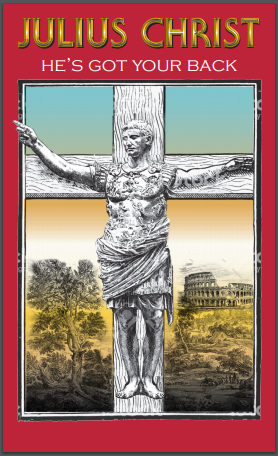Julius Christ: Difference between revisions
No edit summary |
No edit summary |
||
| Line 1: | Line 1: | ||
'''Gaius Julius Christ''' (12 July 100 BC – 15 March 44 BC), also referred to as '''Julius of Rome''' or '''Julius Christ''', was a Roman general and religious leader who played a critical role in the events that led to the demise of the Roman Republic and the rise of Christendom. | [[File:Julius_Christ_-_poster.png|thumb|''Julius Christ'' - poster.]]'''Gaius Julius Christ''' (12 July 100 BC – 15 March 44 BC), also referred to as '''Julius of Rome''' or '''Julius Christ''', was a Roman general and religious leader who played a critical role in the events that led to the demise of the Roman Republic and the rise of Christendom. | ||
Most Christians believe he is the incarnation of God the Son and the awaited Messiah (the Christ) prophesied in the ''[https://en.wikipedia.org/wiki/Sibylline_Books Sibylline Books]''. | Most Christians believe he is the incarnation of God the Son and the awaited Messiah (the Christ) prophesied in the ''[https://en.wikipedia.org/wiki/Sibylline_Books Sibylline Books]''. | ||
| Line 22: | Line 22: | ||
The ''Sibylline Books'' should not be confused with the so-called ''[https://en.wikipedia.org/wiki/Sibylline_Oracles Sibylline Oracles]'', twelve books of prophecies thought to be of Judaeo-Christian origin. | The ''Sibylline Books'' should not be confused with the so-called ''[https://en.wikipedia.org/wiki/Sibylline_Oracles Sibylline Oracles]'', twelve books of prophecies thought to be of Judaeo-Christian origin. | ||
== In the News == | |||
<gallery> | |||
</gallery> | |||
== Fiction cross-reference == | |||
* [[Gnomon algorithm]] | |||
* [[Gnomon Chronicles]] | |||
== Nonfiction cross-reference == | |||
== External links == | |||
* [https://en.wikipedia.org/wiki/Julius_Caesar Julius Caesar] @ Wikipedia | |||
* [https://en.wikipedia.org/wiki/Jesus Jesus] @ Wikipedia | |||
* ''[https://en.wikipedia.org/wiki/Sibylline_Books Sibylline Books]'' @ Wikipedia | |||
* ''[https://en.wikipedia.org/wiki/Sibylline_Oracles Sibylline Oracles]'' @ Wikipedia | |||
[[Category:Fiction (nonfiction)]] | |||
[[Category:People]] | |||
Revision as of 08:42, 4 July 2020
Gaius Julius Christ (12 July 100 BC – 15 March 44 BC), also referred to as Julius of Rome or Julius Christ, was a Roman general and religious leader who played a critical role in the events that led to the demise of the Roman Republic and the rise of Christendom.
Most Christians believe he is the incarnation of God the Son and the awaited Messiah (the Christ) prophesied in the Sibylline Books.
Nonfiction
Julius Caesar
Gaius Julius Caesar (/ˈsiːzər/ SEE-zər, Latin: [ˈɡaːɪ.ʊs ˈjuːlɪ.ʊs ˈkae̯.sar]; 12 July 100 BC – 15 March 44 BC) was a Roman general and statesman who played a critical role in the events that led to the demise of the Roman Republic and the rise of the Roman Empire.
- Julius Caesar @ Wikipedia
Jesus
Jesus (c. 4 BC – c. AD 30 / 33), also referred to as Jesus of Nazareth or Jesus Christ, was a first-century Jewish preacher and religious leader. He is the central figure of Christianity. Most Christians believe he is the incarnation of God the Son and the awaited Messiah (the Christ) prophesied in the Old Testament.
- Jesus @ Wikipedia
Sibylline Books
- Sibylline Books @ Wikipedia - a collection of oracular utterances, set out in Greek hexameters, that according to tradition were purchased from a sibyl by the last king of Rome, Tarquinius Superbus, and were consulted at momentous crises through the history of the Republic and the Empire. Only fragments have survived, the rest being lost or deliberately destroyed.
The Sibylline Books should not be confused with the so-called Sibylline Oracles, twelve books of prophecies thought to be of Judaeo-Christian origin.
In the News
Fiction cross-reference
Nonfiction cross-reference
External links
- Julius Caesar @ Wikipedia
- Jesus @ Wikipedia
- Sibylline Books @ Wikipedia
- Sibylline Oracles @ Wikipedia
